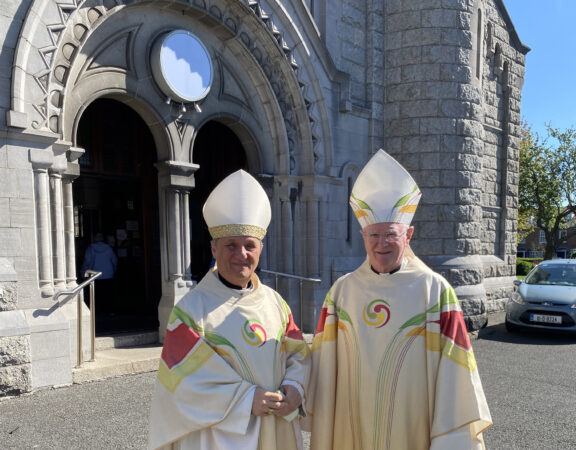VIOLENCE IN IRISH SOCIETY: TOWARDS AN ECOLOGY OF PEACE
Launch of ICJSA Document
Launch of ICJSA Document
Speaking Notes of
Most Rev. Diarmuid Martin
Archbishop of Dublin and Primate of Ireland
———–
Catholic Youth Care, Dublin, 5th June 2008
Most Rev. Diarmuid Martin
Archbishop of Dublin and Primate of Ireland
———–
Catholic Youth Care, Dublin, 5th June 2008
Many – myself included – have over the past years expressed our horror on the occasion of one or other brutal episode of violence in Irish society and indeed there have been far too many of them in the four years since I have become Archbishop of Dublin.
In speaking on such occasions, however, I have always felt a sense of frustration at the fact that the denunciation of violence so often comes too late. It comes when a tragedy has occurred and not earlier when it might have been possible to avoid a tragedy.
The report is a document of the Irish Bishops’ Commission for Justice and Social Affairs (ICJSA) has the merit of drawing attention to and challenging all of us to address the problem of violence in contemporary Irish society in a more organic way than is often the case. It addresses many aspects of violence and reminds us that violence must be addressed at its roots. A response to the current culture of violence requires the building of a broad consensus within society regarding the seriousness of the situation and the urgency of the fight against violence. The point of the ICJSA document is to encourage all those who are concerned about violence in Ireland today to work more closely together.
Fortunately, levels of violence in Ireland are lower than in many other parts of Europe. But there is nothing to be complacent about. The increase in violence is sizeable and there are many troubling elements about the varied culture of violence which we have to address head-on.
Here in this Church, which is attached to the Diocesan Youth Care service, I would put in first place the problem of violence by and among young people. Violence has destroyed the lives of so many young people. I am talking about victims whose lives have been tragically taken and can never be restored to their loved ones; I am speaking also about the lives of the perpetrators. Dramatically, some of these perpetrators are barely out of their childhood and their lives will be marked for ever.
Violence among young people is linked with a curious culture of knives, carried it is said, as a possible means of self defence, but which have become symbols of being part of a culture of violence. I am pleased to see that in Britain new legislation is being introduced to address the question.
Violence among young people is linked with our dubious Irish culture of drink. Sadly it is so often the weakest among young people who pay the price for a persistent fashionable exaltation of a drinking culture.
I know from priests in many parishes how the trade in illegal drugs in Dublin is destroying lives every day in our city. Drugs are at the heart of gangland violence. Young lives are being wasted and families and communities are being ripped apart by the terrible plague of drug abuse. There can be no tolerance of this trade. We should speak in words that people can understand. The drug trade is a murky, shameful world of which no one who has any involvement – as a trader or as a consumer – can be proud. There is no way in which it can be rendered respectable. Drug use is not made respectable because it takes place in the nicer Dublin postal zones.
In every aspect of society, the law is there to protect the weakest and to curb the over confidence of the arrogant. In fighting drug-related crime, the law should be seen to be used against those who seem to feel that they are above the law, while the weakest and the most vulnerable should be protected.
But the challenges of violence and substance abuse go beyond the realm of crime prevention and require a wider outreach to the entire community. I have constantly appealed for greater community mobilisation to address the question of violence in our society. I know that there are many community organizations which have a similar view. I have spoken to community leaders, to local authority representatives, to teachers and Garda representatives in the worst-hit areas. I have listened to mother and fathers whose children have lost their lives or whose lives have been ruined.
Much good work is already being done. There is a particularly good Garda-community liaison in this area. Such work needs to be replicated around the country and experiences and knowledge widely shared.
I can only praise the courage of individuals and communities who, notwithstanding threats and intimidation, are willing to bring to the attention of the relevant authorities the information they need to act against those who seek to profit from the suffering and addictions of others and to impose their rule by violence.
There are many other forms of violence which need to be addressed. This ICJSA document addresses some of them. It challenges us as individuals and communities to compile our own lists. There is violence within families, especially against women and children. There is bullying in schools. There is the violence of money-lenders. There are worrying examples of violence against immigrants. There are serious incidents of violence against gay people. Many elderly people tell me about their fear, especially if they are living alone. I hope that the ICJSA document will be a renewed occasion to focus on these and to identify other emerging focal points of violence.
Violence in the last resort is an attempt to impose one’s own views and importance of others. In that sense it is a threat to democracy.
The ICJSA document is addressed in the first place to the Christian community. Christians must shun violence. When faced with the violence of those who, led by Judas, come to apprehend him, Jesus clearly repudiates attempts by his own to respond with violence, witnessing rather to the power of self-giving love even unto death. It was that love which then opened the path to new life, while Jesus’ proverb to those would espouse violence retains its stark validity today: “all those who take the sword will perish by the sword”. Espousing violence renders all of us less safe, especially the very ones who themselves espouse violence.









